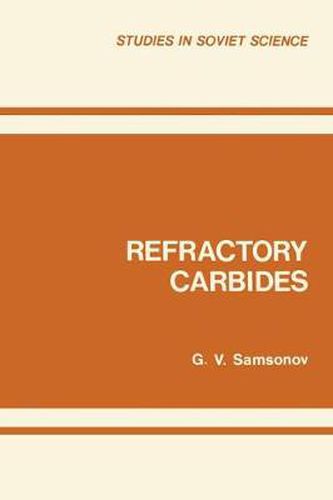Readings Newsletter
Become a Readings Member to make your shopping experience even easier.
Sign in or sign up for free!
You’re not far away from qualifying for FREE standard shipping within Australia
You’ve qualified for FREE standard shipping within Australia
The cart is loading…






This title is printed to order. This book may have been self-published. If so, we cannot guarantee the quality of the content. In the main most books will have gone through the editing process however some may not. We therefore suggest that you be aware of this before ordering this book. If in doubt check either the author or publisher’s details as we are unable to accept any returns unless they are faulty. Please contact us if you have any questions.
The present stage of technological development makes new and ever more complex demands on materials that have to work under conditions of high temperature and pressure, in high vacuum, and in corrosive media. In consequence special importance is now at tached to the refractory compounds of transition metals of groups IV to VI with such nonmetals as boron, carbon, silicon, and nitro gen. These compounds possess high melting points, great hard ness, and high refractory and corrosion-resisting properties. The most widely used and important compounds of this type from a technological point of view are the carbides, which are already fairly widely used in various fields of technology. The present collection of papers contains the results of re cent investigations into methods of producing high-purity carbides and also components made of the carbides and their alloys. Great attention has been paid to the study of a wide range of properties of the carbides and of alloys based on them, viz., the electro-and thermophysical, thermodynamic, mechanical, and chemical prop erties, and also to the utilization of the carbides as wear-and abrasion-resistant materials. In contrast to many previous publications dealing with carbides, the results presented in this collection relate to the properties of carbides having a definite phase composition, corresponding to a higher degree of purity 0 In some of the contributions the physical and chemical properties of the carbides are interpreted in terms of certain solid-state models and concepts concerning the types of chemical bonding in these compounds.
$9.00 standard shipping within Australia
FREE standard shipping within Australia for orders over $100.00
Express & International shipping calculated at checkout
This title is printed to order. This book may have been self-published. If so, we cannot guarantee the quality of the content. In the main most books will have gone through the editing process however some may not. We therefore suggest that you be aware of this before ordering this book. If in doubt check either the author or publisher’s details as we are unable to accept any returns unless they are faulty. Please contact us if you have any questions.
The present stage of technological development makes new and ever more complex demands on materials that have to work under conditions of high temperature and pressure, in high vacuum, and in corrosive media. In consequence special importance is now at tached to the refractory compounds of transition metals of groups IV to VI with such nonmetals as boron, carbon, silicon, and nitro gen. These compounds possess high melting points, great hard ness, and high refractory and corrosion-resisting properties. The most widely used and important compounds of this type from a technological point of view are the carbides, which are already fairly widely used in various fields of technology. The present collection of papers contains the results of re cent investigations into methods of producing high-purity carbides and also components made of the carbides and their alloys. Great attention has been paid to the study of a wide range of properties of the carbides and of alloys based on them, viz., the electro-and thermophysical, thermodynamic, mechanical, and chemical prop erties, and also to the utilization of the carbides as wear-and abrasion-resistant materials. In contrast to many previous publications dealing with carbides, the results presented in this collection relate to the properties of carbides having a definite phase composition, corresponding to a higher degree of purity 0 In some of the contributions the physical and chemical properties of the carbides are interpreted in terms of certain solid-state models and concepts concerning the types of chemical bonding in these compounds.